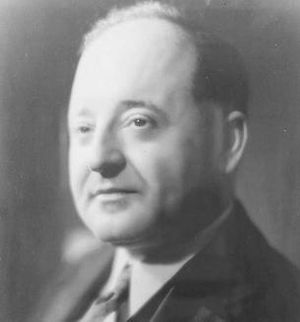Louis Wirth facts for kids
Quick facts for kids
Louis Wirth
|
|
|---|---|

Louis Wirth
|
|
| Born | August 28, 1897 Gemünden, Rhine Province, Prussia
|
| Died | May 3, 1952 (aged 54) |
| Nationality | American |
| Alma mater | University of Chicago |
| Scientific career | |
| Fields | Sociology |
| Academic advisors | |
Louis Wirth (born August 28, 1897 – died May 3, 1952) was an American sociologist. Sociologists study how people live together in groups and societies. Wirth was part of the Chicago School of sociology, a group of thinkers who focused on city life.
He was very interested in how people live in cities, how different groups behave, and the influence of mass media. Many people see him as one of the most important experts on city life. He also led important groups, serving as the first president of the International Sociological Association (from 1949 to 1952) and the 37th president of the American Sociological Association (in 1947).
Contents
Louis Wirth's Life Story
Louis Wirth was born in a small village called Gemünden in Germany. He was one of seven children. His father was a cattle dealer, and his family was Jewish.
In 1911, when Louis was 14, he moved to the United States. He went to live with his older sister and uncle in Omaha, Nebraska. Soon after arriving, he met and married Mary Bolton. They had two daughters, Elizabeth and Alice.
Studying City Life
Louis Wirth studied in the United States and became a key figure in the Chicago School of Sociology. This group focused on understanding cities. Wirth was especially interested in how people live in cities and the social changes that happen there.
His most famous work was an essay called Urbanism as a Way of Life. He wrote it in 1938. In this essay, Wirth looked at cities and rural areas as two very different types of communities. He wanted to understand what makes city life unique.
Understanding Urbanism
Wirth believed that living in a city changes how people connect with each other. He thought that in cities, people often have fewer close, personal relationships. Instead, they have more short, less personal interactions. He also felt that city life could weaken family ties and neighborhood bonds.
He noticed that families in cities tended to be smaller. People might marry later or have fewer children than those in the countryside. This could sometimes lead to more isolation for individuals.
Positive Sides of City Life
Even though Wirth pointed out some challenges of city life, he also saw many good things. He believed that cities were important for human progress. He wrote that cities are where modern civilization truly began.
Wirth saw cities as places of:
- Freedom: People in cities often have more choices.
- Toleration: Cities are often more accepting of different ideas and people.
- Progress: New inventions, science, and smart ideas often come from cities.
He believed that cities have always been centers for new ideas and growth.
Studying Minority Groups
Wirth's own experiences as a Jewish immigrant helped him understand the challenges faced by minority groups. He studied how Jewish immigrants adjusted to living in American cities.
His work helps us understand the problems that many different minority groups face. This includes ethnic minorities, people with disabilities, and the elderly. These groups can sometimes experience prejudice, discrimination, or be left out of society. Wirth's ideas are still helpful today for understanding these issues.
A good book that collects many of Wirth's writings is On Cities and Social Life, published in 1964.
 | Precious Adams |
 | Lauren Anderson |
 | Janet Collins |

